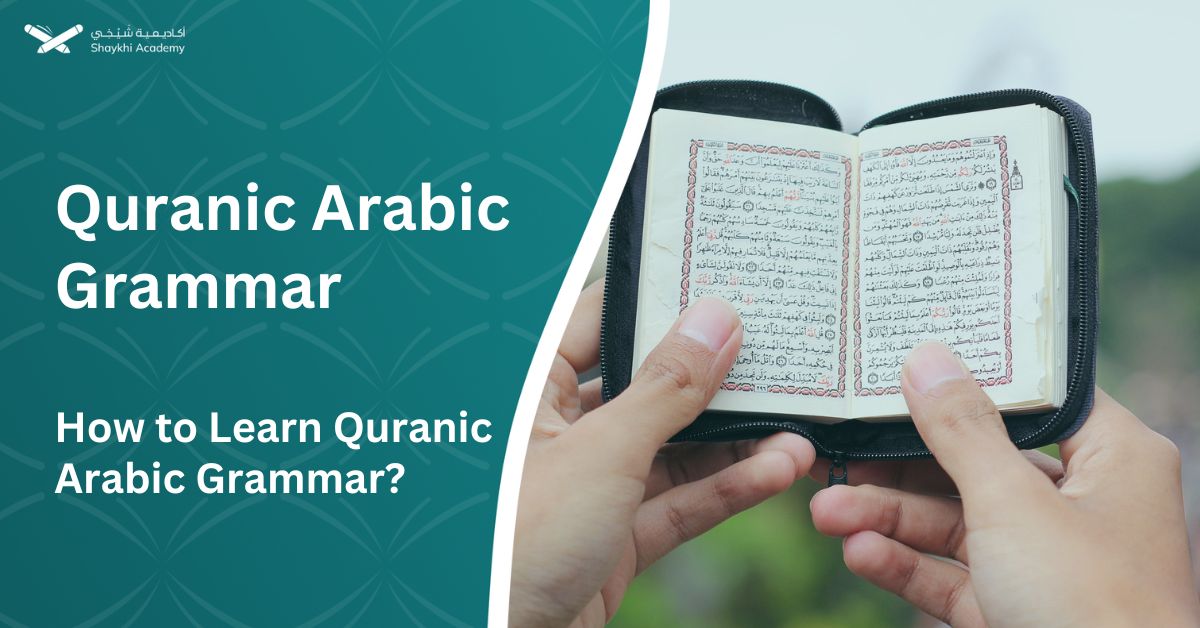Quranic Arabic grammar forms the foundation for understanding the Holy Quran in its original Classical Arabic form. It encompasses the study of letters, words, and sentences, providing insights into the structure and function of language within the Quranic text.
Branches of Quranic grammar include lexicon, morphology, syntax, derivation, and rhetoric, each contributing to a deeper appreciation and comprehension of the Quran’s linguistic beauty and meaning.
Learning Quranic Arabic grammar is essential for Muslims seeking to engage with the Quran and deepen their understanding of its teachings. Starting with foundational concepts and gradually progressing to more complex topics, learners can develop proficiency through consistent practice, guided study, and dedication to their learning journey.
Seeking guidance from experienced instructors, utilizing resources, and engaging in regular Quranic recitation further enhance the learning process.
Any Muslim who wants to understand the Holy Quran Book more deeply may grasp Quranic Arabic grammar with enough practice and determination. For students of all levels, understanding the linguistic genius underlying Allah’s holy revelation alters Quranic recitation, interpretation, and Islamic studies. Let’s list details of this.
What is Quranic Arabic Grammar?
Quranic Arabic grammar, synonymous with Quranic grammar, encompasses the fundamental grammatical structures of the Arabic language, including letters, words, and sentences, elucidating the relationship between form and function.
Understanding Quranic grammar facilitates deeper comprehension of the Quran’s meanings, as grammatical structures provide crucial contextual insights. The study of Quranic grammar encompasses five branches: lexicon (al-lughah), morphology (at-tasrif), syntax (an-nahw), derivation (al-ishtiqaq), and rhetoric (al-balaghah).
Each branch contributes to unraveling the linguistic intricacies and stylistic excellence of the Quran, guiding learners to construct coherent sentences, convey meaning accurately, and appreciate the Quran’s eloquence within its sentential context.
Why Is it Important to Learn Quranic Arabic Grammar?
Mastering Quranic Arabic grammar is crucial for Muslims worldwide to engage with and comprehend the Holy Quran in its original Classical Arabic form. Initially, delving into the intricate grammatical structures and rules of Quranic Arabic may seem daunting for beginners, encompassing everything from terminology to sentence construction.
However, with the right learning materials and a systematic approach, anyone can gain proficiency in Quranic grammar. Starting with foundational elements such as common Quranic vocabulary and everyday phrases lays a strong groundwork before tackling more advanced concepts like I’raab inflection or grammatical states.
Regular recitation and tajweed practice further enhance language learning and usage. Shaykhi Academy offers well-structured Quran classes led by experienced Islamic scholars, both online and in-person, providing students with guided paths to success in their Quranic studies.
We study Arabic syntax to learn how to construct coherent sentences, convey meaning in Arabic, and avoid grammatical mistakes. Arabic morphology and lexicology both deal with the internal structure of words.
The capacity to deal with word endings to read and understand in a sentential context is the focus of Arabic grammar.
How to learn Quranic Arabic grammar?
By knowing the fundamental ideas that make up Quranic Arabic grammar are as follows:
1. The Basics of Grammar in the Quran:
The elements of traditional Arabic syntax, such as sentence structure, morphology, and parts of speech (nouns, verbs, and particles), are all part of Quranic grammar. Learning the basic blocks enables students to construct Quranic statements and verses that are grammatically correct.
2. Recognizing the Grammatical Inflection of I’raab:
In Quranic Arabic, the term “i’raab” refers to the particular case endings that are appended to nouns, adjectives, and verbs to denote their grammatical function within a phrase. Acquiring knowledge of I’raab inflection is essential for deciphering Quranic terminology.
3. Understanding Various Grammar States in the Quran:
Words can assume many grammatical states, such as rafaʿ (nominative), naṣb (accusative), or Jazm (genitive), each of which indicates a distinct syntactic role when studying Quranic Arabic.
4. Studying Morphology:
Morphology, or “tasrif,” involves understanding the structure and forms of words in Quranic Arabic. This includes recognizing patterns of verb conjugations, noun declensions, and the various forms that words can take based on their grammatical function.
5. Analyzing Sentence Structure:
In Quranic Arabic grammar, analyzing the structure of sentences helps learners understand how words are arranged to convey meaning. This involves identifying subjects, predicates, objects, and other components of sentences to comprehend the relationships between them.
6. Learning Syntax Rules:
Syntax, known as “nahw,” focuses on the rules governing how words are combined to form meaningful sentences in Quranic Arabic. This includes understanding sentence order, word agreement, and the use of connectors and particles to convey specific meanings.
7. Practicing Regularly:
Consistent practice is essential for mastering Quranic Arabic grammar. This includes reading Quranic verses regularly, analyzing their grammatical structures, and applying learned grammar rules to comprehend and interpret the text accurately.
8. Seeking Guidance:
Seeking guidance from knowledgeable teachers or resources specializing in Quranic Arabic grammar can provide valuable insights and clarification on complex grammatical concepts. Joining Quranic Arabic classes or study groups can also facilitate learning through collaborative discussion and feedback.
9. Using Resources:
Utilize various resources such as textbooks, online courses, grammar guides, and language learning apps tailored to Quranic Arabic grammar. These resources often provide explanations, examples, exercises, and practice materials to reinforce learning and retention.
10. Patience and Persistence:
Learning Quranic Arabic grammar requires patience and persistence. It is a gradual process that takes time and dedication to master. Stay committed to your learning journey, and celebrate progress, no matter how small, along the way. With perseverance and consistent effort, you can develop a solid understanding of Quranic Arabic grammar and enhance your comprehension of the Quran.
Read more about Arabic Grammar Course
Steps to Learn Quranic Arabic Grammar:
These are the top 6 recommendations for anyone looking to study Quranic Arabic grammar and go on a trip with the text.
1. Goal
of the most crucial places to start. Set out to understand and ask Allah to guide you on this trip. Your education will ultimately help you become closer to Allah by assisting you in comprehending and learning what His advice entails. We beseech Allah to assist us in obtaining knowledge, to make it simple, and to take away any obstacles.
2. Give it top attention
After enrolling in a program or finding a suitable teacher, time management becomes crucial. All too frequently, other obligations in your life might interfere with your ability to study. Give Quranic Arabic grammar top importance and set aside time each day to study, review, and put what you’ve learned into practice.
3. Commit to memory
You will need to commit rules and charts related to Arabic grammar to memory to advance your understanding of the Quran. If there is anything you need to commit to memory after class, make sure you do it! Every day, set aside some time to go over what you have learned. Print the charts, glue them to a wall, your journal, your automobile, compose a song, draw mind maps, and so on. Do it, whatever it may be! Learning to memorize is crucial as you go. If not, it could get challenging to comprehend the teachings that follow.
4. Go through the Quran
After reading it in Arabic, put what you’ve learned to use. You will gradually find that your comprehension of the Arabic language improves along with your ability to relate to and comprehend the Quran. You could occasionally think that your vocabulary in Arabic is insufficient. Making a dictionary for oneself is a helpful approach. Note down the definition of each new term you encounter. It’s also helpful to have a copy of the Quran translated. The most important thing is to relax; you will acquire a lot of language in the process.
First things first, it’s important to grasp the principles of the Arabic language. Study the rules and charts and put what you learn to use when you read the Quran.
5. Accept that mistakes will be made
Have an optimistic attitude while you tackle your tasks. Try it out and don’t be afraid to make mistakes—you may get a lot of knowledge from them. Reviewing your work, identifying the error, fixing it, and drawing lessons from it are crucial.
6. Be joyful and don’t worry
There will be numerous moments as you start this trip when you will question yourself, think you don’t know enough Arabic, or feel like you don’t understand a rule completely. It’s important to keep in mind that this is typical. The fact that you are doing this on behalf of Allah is more significant. Thus, when studying at your own pace, don’t waver. Ask your teacher or work in a group with your peers if you don’t comprehend anything. For collaborative learning, you may create a group on Facebook or WhatsApp. You will advance the more you practice, prepare, conserve, and be patient with yourself and your studies.
Recall that this is not a race; all you have to do is understand the guidelines, put them into practice, and have faith that Allah is guiding you.
Make a connection with Shaykhi Academy, a reputable educator, you can choose from a wide variety of in-person and online courses.
Read more about: Does Arabic Have Grammatical Gender? Word Gender In Arabic Guide
Unlock the Path to Quranic Mastery with Shaykhi Academy!
Are you seeking the finest Quranic education right from the comfort of your home? Look no further! Shaykhi Academy stands out as a premier online Quran learning platform, dedicated to providing exemplary education to both children and adults.
Why Choose Shaykhi Academy?
- Connect with highly qualified native tutors.
- Flexible scheduling to suit your busy lifestyle.
- Affordable classes tailored for all levels.
- Accessible from anywhere around the globe.
Discover Our Range of Courses:
- Arabic Noorani Qaida: Lay a solid foundation for Quranic studies.
- Online Quran Classes for Kids: Engaging lessons for lifelong learning.
- Tajweed Rules for Kids: Learn to recite with confidence.
- Quran Hifz for Kids: Step-by-step guidance to memorize the Quran.
- Quran for Adults: Introduce yourself to Quran reading and Tajweed rules.
- Online Arabic Courses: Master the language of the Quran.
- Islamic Studies: A wide range of topics related to Islam, including theology, law, Quranic studies, Hadith.
Don’t Miss Out on Your Chance to Excel!Whether you’re a beginner or seeking advanced knowledge, Shaykhi Academy can guide you! Book your free trial now and make Ramadan 2024 your Quranic turning point!

Conclusion:
Mastering Quranic Arabic grammar is a transformative journey that opens doors to a deeper connection with the Holy Quran and its timeless wisdom. By delving into the intricate grammatical structures and linguistic nuances of Quranic Arabic, learners embark on a path of spiritual growth and intellectual enrichment.
With dedication, perseverance, and reliance on Allah’s guidance, students can navigate the complexities of Quranic grammar, unlocking profound insights and enhancing their appreciation of the Quran’s divine message. Through structured study, regular practice, and a steadfast commitment to learning, individuals can cultivate a deeper understanding of Quranic Arabic grammar, empowering them to engage with the Quran with clarity, insight, and reverence.

















































